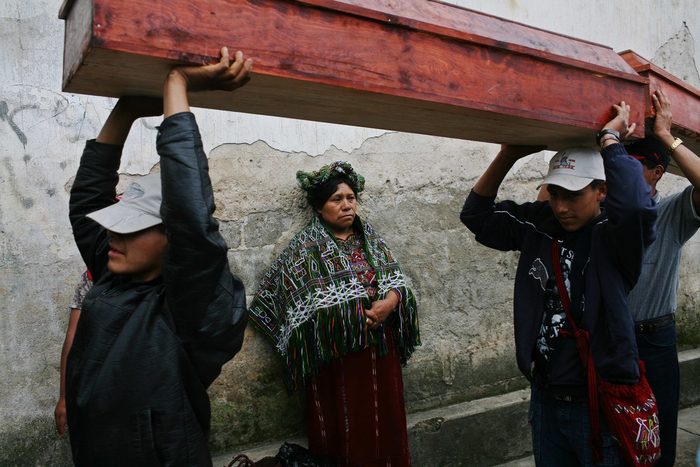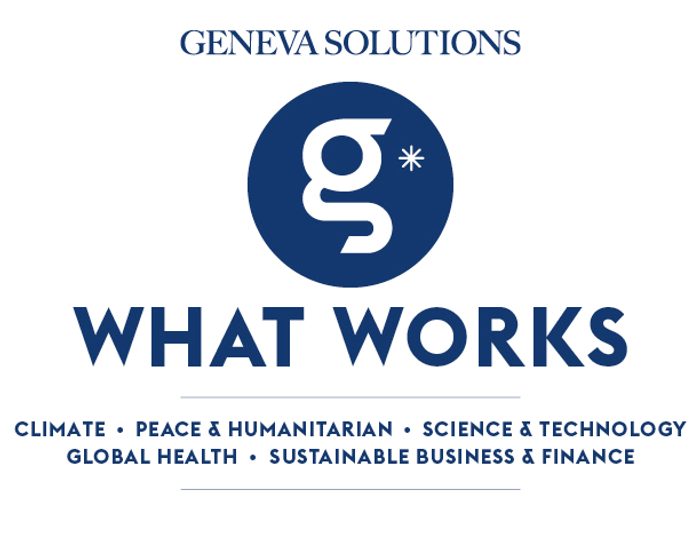Good morning, this is Paula. As countries take on the role of seeking justice for victims of crimes committed outside of their jurisdictions, Belgium sentences four former Guatemalan officials in absentia to crimes committed during Guatemala’s 36-year-long civil war.
In our monthly war crimes round-up, Leah Olasehinde and Alain Werner of Civitas Maxima bring us the latest on bringing perpetrators to justice around the world.
We will be back next year, on 3 January, with more coverage of international Geneva. In the meantime, we wish you a wonderful holiday break, and don’t forget to check your mailbox next week for a special edition of our monthly digest. Subscribe here if you haven’t already done so! |

|

Decades after Guatemala’s 36-year civil war, which saw over 200,000 people killed and forcibly disappeared by authorities, the search for justice, as well as more recent violations, continues. Villagers carry the coffin of a relative killed in 1981 during a massacre of 79 people by the army at a mass burial in Cocop, 9 June 2008. (AP Photo/Rodrigo Abd)
|
|
This month, a Belgian court sent a strong message to perpetrators of international crimes in its conviction and sentencing of five Guatemalan former military and political officials, all of whom were tried in absentia.
During Guatemala’s decades-long civil war in which over 200,000 people are estimated to have lost their lives or been forcibly disappeared at the hands of the country's leaders, four Belgian missionaries were targeted by the officials. Three were killed, while the one surviving victim was kidnapped and tortured.
In 2001, the victims’ families used Belgium’s genocide law to bring a criminal case to court. This case is the first time that Guatemalan state officials have had to answer for the atrocities committed during the conflict before a foreign court. The trial lasted two weeks and was held in absentia: three of the defendants are currently imprisoned in a military facility in Guatemala on other charges while the two others are fugitives and subject to international arrest warrants. On 15 November, a court in Louvain sentenced them to life imprisonment on 19 charges of crimes against humanity.
As a growing number of national jurisdictions endeavour to seek justice for victims of international crimes committed outside their territories, one recurrent obstacle to proceedings is the absence of the suspected perpetrator in the country seeking to prosecute them. Authorities prefer to have their suspect within their reach, on their own territory or in a state which can be relied on to execute an international arrest warrant. Cases otherwise often end before they can even begin.
Belgian authorities, however, decided that seeking justice for the victims of these atrocities was too important to forgo. They have thus been able to provide answers to the victims and their families, and have sent a strong message to other perpetrators of atrocities that their physical absence does not prevent their guilt from being proven in a court of law.
Last month, the International Criminal Court, which does not allow for its trials to be held in absentia, allowed for the hearing of charges against Joseph Kony, the Ugandan founder of the War’s Resistance Army, designated as a terrorist organisation by United Nations peacekeepers, to be held while he remains at large. Time will only tell if the same will apply in its case against President Vladimir Putin and his child’s rights commissioner, Maria Lvova-Belova, for charges relating to the deportation of Ukrainian children to Russia.
– Leah Sade Olasehinde and Alain Werner, Civitas Maxima
Read the full story on our website 🌐
|
|
Here's what else is happening
|
|
GS news is a new media project covering the world of international cooperation and development. Don’t hesitate to forward our newsletter!
Have a good day!
|

|
|
Avenue du Bouchet 2
1209 Genève
Suisse
|
|
|
|








